Why are Koreans obsessed with luxury goods?
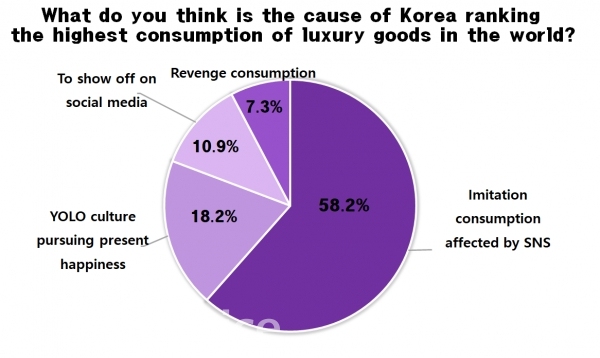
Scrolling through photos on social media, countless images of hocance, a combination of hotel and vacance, luxury goods, and fine-dining are being uploaded without a break. Such sights induce ostentatious and imitative consumption that tends to make individuals jump on the bandwagon, resulting in a desire to display one’s wealth compared to when social media was not actively used.
In a student survey conducted by Ewha Voice from May 9 to 15, the result revealed intriguing insights about luxury consumption and its impact on individuals. Out of 54 respondents, 81.5 percent admitted to having indulged in luxury goods, luxury vacations, fine dining, or trying omakase. Notably, 52.7 percent of the participants confessed to encountering images of luxury consumption on social media platforms, and 90.9 percent have felt compelled to purchase luxury items after being exposed to such visuals. However, 54.5 percent of respondents claimed they managed to resist the temptation to overspend beyond their original plans, despite being exposed to extravagant displays on social media.
When it comes to social gatherings with friends, lovers, or acquaintances, where spending levels and the expenditure scale often increase, 61.8 percent of respondents confessed to occasionally feeling burdened by such situations, while a mere 16.4 percent reported not having encountered such experiences.
The survey also delved into perceptions surrounding the persistent high interest rates, high inflation, and economic recession, questioning whether consumer spending levels had actually increased and become more prevalent. Of the respondents, 50.9 percent generally agreed with this viewpoint.
Last year, South Korea was identified as the country with the highest per capita luxury consumption worldwide, according to investment bank Morgan Stanley. Regarding this, 58.2 percent of participants attributed the phenomenon to the rise of imitation consumption fueled by the influence of social media. A further 18.2 percent of the respondents believed that the YOLO culture, which prioritizes present happiness, has played a significant role in driving this trend.
Georgi Gevorkian, a Georgian exchange student from the University of Applied Science Kufstein in Austria, shared his views.
Gevorkian, who has spent about nine months in South Korea so far, revealed that he could sense this phenomenon while casually walking down the street. Stressing that he does not intend to generalize all Koreans, Gevorkian figured that Koreans do own lots of well-established brand products, especially electronic devices.
He explained that South Korean culture is highly reputation-driven, adding that such a materialistic lifestyle is the easiest way to show high status.
Another thing Gevorkian noticed is the uncertainty that the young generation has to go through, a case not just limited to South Korea. Since it is getting harder to finance huge investments such as housing without taking a loan, people tend to identify themselves by consuming luxurious products.
Gevorkian described that Austria, where he spent much of his childhood, has the same tendency.
“People like to spend most of or a huge portion of their income on luxuries because they like this feeling of elevated lifestyle,” he said. “This may create the illusion of escaping from the monotonous lifestyle, and make them feel more special by showcasing their consumption on social media or other types of platforms.”
Luxury product craze: Is it sustainable?
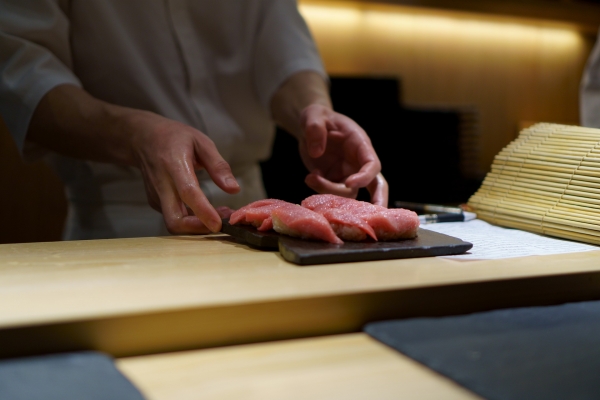
“Open run,” which means rushing into the store to buy luxury products as soon as the store opens, and “seugangsincheong,” a compound word of Japanese seafood “sushi” and course enrollment, are newly-coined words that have recently emerged in Korea. The word “seugangsincheong” reflects a trend in which restaurant reservations for omakase have become intensively competitive, similar to college course registration. Omakase is an expensive meal style in which chefs serve various kinds of dishes suitable to customers’ tastes and needs, but recently, more and more people are enjoying it regardless of their economic level. The very existence of these new words is indicative of the recent increase in Koreans’ consumption level.
According to Suh YongGu, a professor from the Division of Business Administration at Sookmyung Women’s University, Korea has become the fastest-growing country in the luxury goods market over the past three years. The world’s top three high-end brands are at the apex of sales in Korea recently, and Rolls-Royce, the world’s most expensive motor brand, also sold more in Korea than Japan last year. Experts and even the company itself have commented on this unprecedented phenomenon, which is more unusual than ever, as Japan is known for being the traditional luxury consumer nation.
As reasons for this sudden phenomenon in Korea, Professor Suh cited rapid increases in income or real estate and thus an increase in consumer confidence.
He explained that the number of ultra-high-net-worth individuals who are high-value asset owners has continued to increase in Korea recently. Even if they have not experienced a significant increase in income, consumers are gaining confidence in consumption as real estate values have risen overall due to the previous government’s policies.
Suh believes that Koreans’ sense of rivalry and desire to live well also encouraged a competitive consumption culture, and therefore saw the recent craze in luxury consumption as a sustainable phenomenon.
“Materialism is so prevalent in Korea that the greeting of wishing other people to be prosperous is common in our country but cannot be seen anywhere else,” Suh said. “In addition, the traditional sequence culture and competitive spirit of Koreans are combined with materialism, leading to imitation in consumption.”
The luxury consumption craze can also be interpreted as unconscious revenge consumption of Millennial and Generation Z women toward Korean society. Suh claimed that women’s unhappiness is bound to be high in our country, where gender-based wage inequality ranks the highest in the world, and the structure of society is still male dominated, making women feel skeptical about the gap between their actual power and the reality of society. Yet, the consumption of luxury products can at least provide temporary happiness amid the frustration or rage caused by living in such a society.
While the consumption of luxury products has increased steadily, Suh pointed to the Veblen effect as a problem. The current situation, in which Korean consumers keep buying products indiscriminately despite the continued rise in prices, is unusual and impractical from an economic perspective. Moreover, he expressed concern that since luxury products are not likely to be scheduled purchases, and consumption is often made even though income is not high, it can easily lead to unreasonable decision-making that only promotes vanity and causes economic problems, with some consumers falling into the habit of unnecessary consumption, taking out loans to purchase luxury products.
Suh therefore recommended consumers to form sensible consumption habits to avoid reckless spending and develop healthy choices.
“Consuming luxury products should not be the purpose of life, but I know this is too textbook an approach,” remarked Suh, giving a little smile before continuing.
He then suggested a more realistic way to use luxury products as means of investment. Despite some issues and problems, Suh believes that the luxury consumption ecosystem could be successful if reasonable purchases are made among consumers.
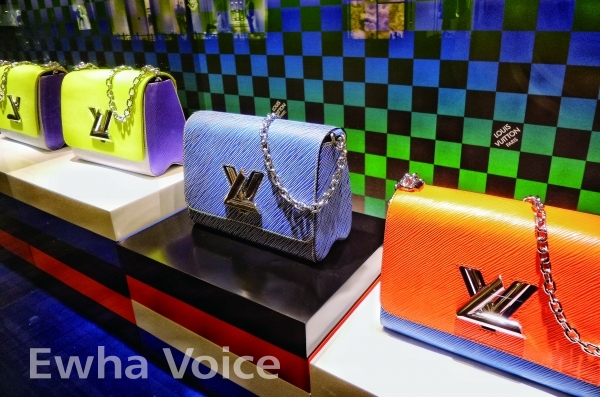
Lim Chaeun, a professor emeritus from the School of Business at Sogang University, provided further insight on the topic.
For the primary reasons, Lim pointed to increasing incomes. An increase in assets such as property and stock along with higher salaries of conglomerates and financial companies has improved the average income of South Koreans. Due to such a rise, more people can now affordcomparatively expensive foreign automobiles and luxury brand products.
For another reason, Lim stressed that the polarization of wealth accelerated the current consumption trend. One side tends to show hedonic consumption thanks to the wealth effect from its increased assets, whereas the other side, who gave up on purchasing houses due to soaring prices, shows ostentatious consumption without saving.
Lim also stated that the suppressed desire for consumption during the COVID-19 era has exploded in the form of revenge consumption, synergizing with the marketing strategies of luxury brands, which have raised prices to make their products look more attractive.
A greater number of people being able to afford luxury products does also insinuate that the Korean economy is continuously growing. However, some say that spending money on such products seems extravagant. These negative perceptions, as Lim explained, stem from the remaining inclination toward thrift and saving of the industrialization era in the past. Moreover, since South Korea is a homogeneous country, lavish consumption can build incompatibility and disharmony between different classes of people.
Lim further described luxury brands’ marketing strategies, exemplifying how playing golf is trending in South Korea nowadays.
“Golf is seen as a symbol of success as it requires both money and time,” Lim said. “It is especially popular these days as people tend to imitate how the leading class or the rich spend their leisure time playing golf. This kind of cultural influence can be found everywhere, such as noblesse marketing of banks or credit card companies.”
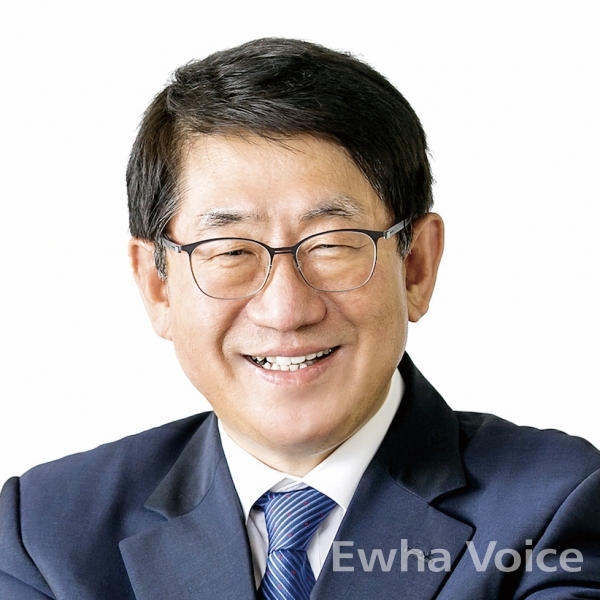
Lim concluded by encouraging people not to be judgmental of other people’s spending habits. As consumption is something that is highly subjective, unless one is spending money on something illegal, there is no reason for it to be an issue. Although it may seem unreasonable to some, there are always acceptable reasons for people to purchase extravagant things. The same goes for the press. Lim disclosed that it is not common to run into news articles criticizing how people buy lots of luxury products or imported goods in other countries, emphasizing that we do not have to perceive it in a negative way.
Finally, he advised people who make purchases to be more confident in what they buy. If people are financially able and wish to purchase a certain product, they can spend their money on whatever they want.
Media influences on excessive consumption
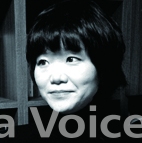
In terms of such consumption patterns, it is hard to ignore the influence of the media. Due to the wide use of social media, especially Instagram, individuals are now able to simply look into the lives of celebrities, reducing the psychological distance from them. In the past, celebrities were seen as people living in a different world, but they are now familiar and close with the help of social media. Thus, our desire to follow celebrities’ lifestyles and fashion appears natural.
To further explore the consequences of the development of social media in consumer psychology and behavior, Ewha Voice interviewed Cheon Hye Jung, an associate professor in Ewha’s Department of Consumer Studies.
“South Korea is still in the age of social media, which is the most powerful source for showing off and ostentation,” Cheon said. “We feel the whole world seems to live a luxurious and delightful life except for ourselves.”
Social media has also created a circumstance in which people judge each other based on their life as displayed in social media.
“When making friends with someone you have never met before, the image you portray yourself through social media influences your first impression of that particular individual,” Cheon said. “As a result, there are more users who want to show their most ideal appearances, including traveling abroad, spending their vacation in luxurious hotels, dining at expensive restaurants, and purchasing their own luxury goods.”
As regards the image-making happening online, South Korean K-pop idols and well-known actors often shape their images by working as brand ambassadors for luxury brands. For instance, Jisoo from BLACKPINK was selected as a global ambassador for Dior in March 2021, and Danielle, a member of the girl group NewJeans, was selected as a global ambassador for Burberry this January. This has drawn attention from the younger generation, increasing exposure to such luxury brands as the celebrities post photos of themselves wearing the brands’ clothing or accessories.
However, Cheon presented a different idea about the impact of global ambassadors on consumer choice and behavior.
“I am not sure if foreign brands have selected South Korean celebrities as means of altering the psychology of our consumers to perform excessive consumption,” she said. “They might have only considered the level of influence the celebrities have on Korean society merely for promotion purposes.”
Cheon also stated that a number of people are aware of the fact that images on social media may be fake, which makes them less impressed about luxury brands, meaning that the media’s ability to alter consumers’ psychology towards ostentatious consumption may not be as significant as we had thought.

